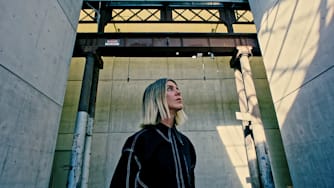Five questions for Sofie Dunert
Sofie Dunert is a Product Development Engineer, working with the development cars as a part of R&D. She’s also the owner of Kiwi, Polestar’s office dog and unofficial morale officer.

How does the reality of your job compare with what people think you do?
When they ask what I do exactly, I find it hard to give a short answer because I do so many different things! That’s something that’s very common at Polestar, and one of the reasons we don’t have job titles. However, the short version is that I am a Product Development Engineer which means I make sure the development cars are in good shape, as well as the whole Research & Development group as I also do a lot of administrative work. There’s a lot of planning, keeping everyone informed and finding answers to people’s questions. Then of course there’s the important task of spreading positive energy, since I bring my dog Kiwi to work every day!
Tell us about a trend that is shaping your area of work at the moment.
I don’t know if it counts as a trend, but we’re finally getting some finished Polestar cars! We have received some Polestar 1 models and very soon we’ll also have a couple of Polestar 2s. A lot of people have been asking if they can take a test drive, but we haven’t had any cars – until now. But I think a general trend is that more people are choosing to go electric. I’ve had an EV for a couple of years now and it’s very different from driving a “regular” car, and I mean that in a positive way. I really don’t like driving fossil-fueled cars anymore because you have to go to gas stations to refuel and it just feels outdated.
What is your favorite invention (besides electricity)?
I am quite practical, and a bit of a control freak, so I would have to say the cellphone. It doesn’t even have to be a smartphone! To be able to reach people regardless of where they are is just fantastic, both from a security standpoint but also for efficiency reasons.
What makes you hopeful for the future?
It’s hard not to take into consideration what is happening in the world right now with the spreading of COVID-19. But sometimes it takes something dramatic like this to happen for people to stop, reflect and realise how dependent we really are on each other. That it’s not enough for just a few people to change their ways to make an impact. We all need to come together as one. I think about the climate debate and how people still say that it’s hard to make a difference on an individual level. In a way, this crisis shows that we can in fact change our ways and work together. It gives you a sense of hope.
What has happened or changed in your area of work during the last 10 years?
Everything in my work has become easier thanks to new technology, especially when I think about the administrative part. When I started working at Volvo, they had just stopped using the telephone book. To get hold of someone, you had to call ten different people to hopefully find the one person you needed to talk to. Now you can just do a quick internet search and immediately find who you’re looking for, where they are and how you can contact them. I’ve always had a job where I’ve needed a wide social network so you can understand the difference it has made for me. When I started, I didn’t have a laptop, so everything was written with pen on paper and then rewritten on a computer then emailed. I do, however, always bring pen and paper to meetings because it feels so rude to look at a screen when someone else is talking.


